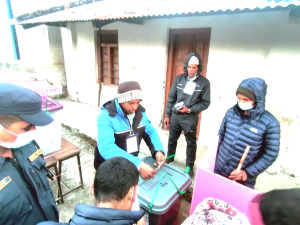Elections at the federal, provincial, and local levels were held across all districts of Nepal in 2079. 4-H Nepal received permission for election observation from the Election Commission, and 534 observers were delegated to more than 250 polling stations in 39 districts. These elections ensured the continuity of the local-level government. It is widely believed worldwide that periodic elections should be free, impartial, fearless, and peaceful; if not done, a state of distrust is formed towards the government, political parties, and the Election Commission.
Democracy is a political system that reaches citizens legitimately policies maintaining the rule of law. Therefore, periodic elections are inevitable in a democratic system. Voting in elections is a sovereign and fundamental right of the voters. Voters can choose the right representatives only if there is a clean, credible, dignified and impartial election. Only fair elections can contribute to the consolidation and development of the democratic system.
In this election, the enthusiasm displayed by people, the strong participation of the younger generation, and the significant representation of women and Dalits were observed. This election has played an important role in bringing the rights provided by the new constitution to the doorsteps of the people and strengthening democracy.

Findings of Election Observation
▪ In previous elections, voters with disabilities faced challenges to cast their ballots in some locations. Polling stations were not seen as disability friendly.
▪ The voting process was delayed due to the time required to search the voter’s names. These issues arose from different serial numbers of the voters who had taken voter ID cards for the last election. In some polling stations, voter identity cards were not found, but in some locations, voter ID cards were sent to one polling station and the names were found in another polling station.
▪ Voters were found to be confused about the polling process, which showed that voters’ education was inadequate.
▪ The lines of male and female voters were segregated at the polling stations and arrangements were made for easy voting to senior citizens, pregnant women, people with disabilities, and unwell voters.
▪ Despite good security facilities in the polling centres, some of the centres lacked security in outer spheres.
▪ Polling was found to be confusing and crowded due to the stationing of polling booths in inappropriate places.
▪ Overall, the polling centres led by women were found to be well managed.
▪ No hurdles were created for the entry of observers into the polling centres. However, monitoring of the polling centres wasn’t easy.
▪ The behaviour of officials and police toward the observers was respectful.
▪ Cadres of the Nepali Congress tore all the ballot papers after finding out that one set of ballot papers was distributed for voting without the signature of the polling officer at the Bhagwati Secondary School polling centre of Simta Rural Municipality-1, Surkhet.
Conclusion:
While acknowledging that the government, political parties, and the election commission didn’t leave any stone unturned to make the election impartial and fear-free, several violations of the code of conduct, blame games, and attacks have been documented. The value of the election will increase only if it is free, impartial, and fear-free. The value of the election must be further strengthened by addressing the drawbacks, implementing the code of conduct, and taking action against the violators. We believe it would be better if the election commission, responsible for conducting upcoming federal and provincial elections, created an action plan taking into consideration the lessons learned from the previous election.
People couldn’t trust the action procedures implemented by the commission due to the lodged complaints of violation of election code of conduct, since no reliable information on the same has been disseminated. This is also found to be one of the reasons why the cases of violation of the code of conduct didn’t decrease.
There have been instances where voters were negatively impacted by inappropriate campaigning, and misuse of money during periods of electoral silence, parties, and so forth. It triggered the realization that the elections are becoming costly, and the idea that they need to win the election by hook or crook is being developed amongst the political parties. The value of the election will increase if the drawbacks seen in the implementation of the election code of conduct are addressed and action is taken against the violators.
